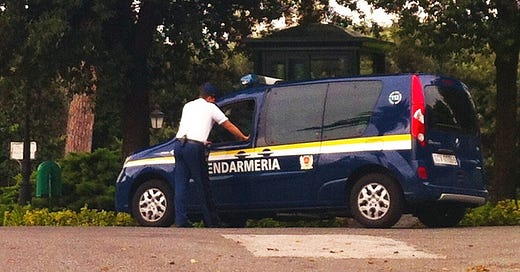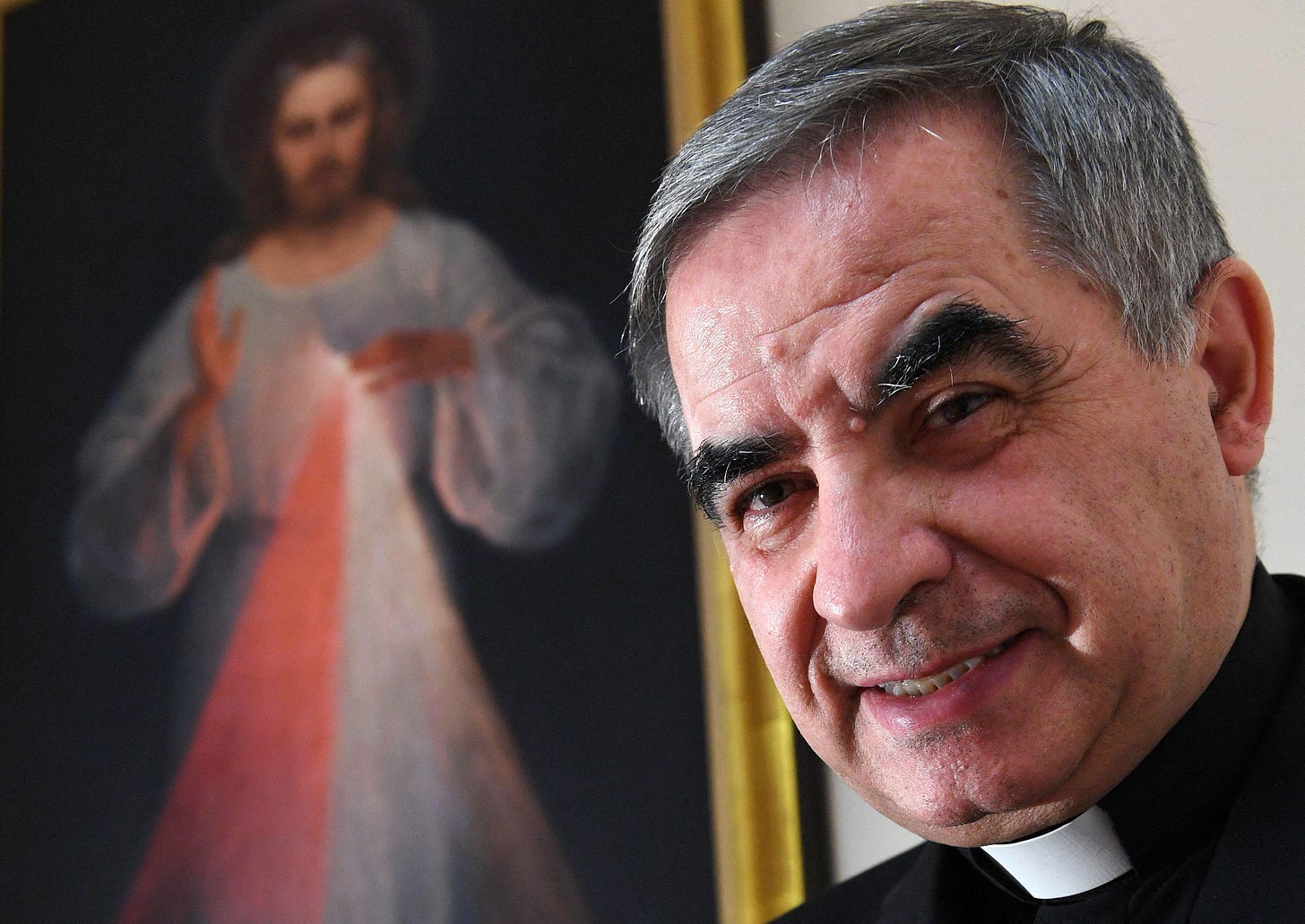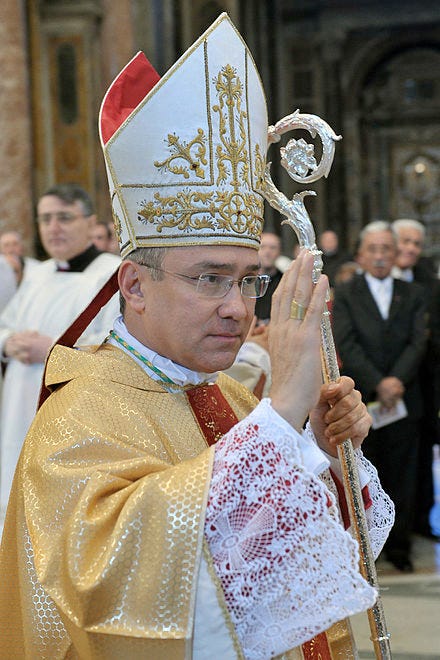
Pope Francis on Friday issued his second change to Vatican City law in two days. In a newly issued motu proprio, the pope amended Vatican City state law, to allow cardinals and bishops to stand trial before the city state’s civilian-led courts, with his prior consent.
The change might set the stage for a dramatic conclusion to the roiling financial scandals at the Secretariat of State.

The change to the law was approved by Francis on April 30, the same day it was published, and the day after the pope issued a raft of other financial laws for the curia and Vatican City, apparently in direct response to the still-unfolding series of financial scandals surrounding the Vatican’s Secretariat of State.
Until the trial law was changed Friday, the only court competent to hear the cases of cardinals and bishops accused of violating Vatican City’s civil law was the Supreme Tribunal of the Apostolic Signatura, where all the judges are cardinals and bishops. The pope alone remains competent to judge cardinals in cases involving spiritual matters or violations of canon law.
But Friday’s new law sees an end to centuries of legal privilege for senior curial prelates, subjecting them to the same legal process and judges as lay people in Vatican City. But if the change to the law in theory is epochal, in practice the new law could prove seismic.
As previously reported by The Pillar, the ongoing criminal investigation by Vatican prosecutors into possible curial financial misconduct dates back to 2019, when the IOR (a Vatican bank) lodged a complaint with financial watchdogs about a loan application from the Secretariat of State.
That loan, for 150 million euros, was meant to refinance a mortgage attached to the London property bought by the secretariat in 2018 as part of its efforts to part ways with the investment manager Raffaele Mincione.
It is a reasonably safe assumption that a person, still less a pope, doesn’t make significant changes to the law unless they intend to use it. In this case, Francis’ decision to expose cardinals and bishops to civil prosecution in the Vatican City court would seem to point to a looming high profile trial for someone.
But who?
A few weeks ago, The Pillar took an in-depth look at the whole field of candidates for a court date in the Vatican, but here are the most likely possibilities to feel the impact of Friday’s new law:
Cardinal Angelo Becciu
If any cardinal is likely to see the inside of a Vatican City courtroom, it is Cardinal Angelo Becciu. The Sardianian was sacked from his role as prefect of the Congregation for the Causes of Saints in September, last year, after the pope was reportedly handed a dossier of evidence against him related to financial misconduct dating back to his seven-year stint as sostituto at the Secretariat of State and de facto papal chief of staff.
At the same time, Becciu was forced to resign the rights of a cardinal which, some noted at the time, was a necessary step (now redundant after Friday’s new law) towards him facing criminal trial in Vatican City.
The list of possible legal issues facing Becciu is long and covers the whole of his term at the Secretariat of State and beyond.
It was under Becciu’s term at the Secretariat of State that the department first became involved with Raffaele Mincione, and invested with him 200 million euros which the secretariat had borrowed from Swiss banks, one of which was later closed for systematic breaches of anti-money laundering regulations.
It was under Becciu’s supervision that, allegedly, those loans were taken out against Vatican deposits at the banks, including charitable funds like Peter’s Pence, and the value of the investments was, allegedly, netted out against the loans to obscure their existence from Cardinal Pell’s Secretariat for the Economy.
Pell and Becciu repeatedly clashed in the early years of the Francis papacy, as the Australian cardinal attempted to implement the pope’s sweeping program of financial reforms. Becciu successfully saw off several attempts at forcing transparency on the secretariat, including cancelling a Vatican-wide audit.
In a recent London court case, Gianluigi Torzi, the businessman at the center of the 2018 London property deal, named Becciu as the subject of blackmail by one of his officials at the Secretariat of State, Fabrizzio Tirabassi. It’s unclear what, if any, compromising material Tirabassi is meant to have had on Becciu.
Becciu also forced the departure of the first Vatican auditor general, Libero Milone, in 2017. Becciu made Milone resign under threat of prosecution, accusing him of spying on his private finances — private finances which were declared fair game by Pope Francis in a change to Vatican law yesterday.
If he is summoned to court in Vatican City, Becciu may have the chance to reconnect with Cecilia Marogna, whom he employed as a “geopolitical strategist and security consultant” for the secretariat. Marogna has herself said she worked as a kind of private spy for Becciu, and she has a warrant out for her arrest in Vatican City. Previous reporting has indicated Becciu continued to authorise payments to Margona, even after he left the secretariat in 2018.
There also remain questions over Becciu’s involvement in the secretariat’s purchase of the IDI, a Catholic dermatology hospital in Rome which went bankrupt in 2012 under debts totalling 800 million euros. The hospital was run into the ground amid widespread accusations of embezzlement, fraud, and money laundering by its president, Fr. Franco Decaminada.
Before Decaminada was arrested by Italian authorities, tried, convicted, jailed, and laicized, he approached Becciu in 2011 about an investment by the secretariat in the hospital worth 200 million. That deal never went through, though Decaminada did hire Becciu’s niece as his personal assistant. Becciu was later allegedly involved in the secretariat securing a loan of 50 million euros from APSA to help fund the purchase of the hospital out of bankruptcy, despite the loan contravening Vatican financial laws.
Becciu denies any misconduct, ever, related to anything. Thanks to the pope’s most recent legal change, he may soon have the chance to prove his innocence in court.
Cardinal Pietro Parolin
Few people would predict the most powerful curial cardinal could find himself indicted by Vatican prosecutors, but, in recent weeks, the chances of Cardinal Parolin facing charges have at least moved from “none” to “slim.”
In addition to having final responsibility for the financial dealings of his department, Parolin has been accused, or publicly admitted, personal involvement in some of the most controversial transactions currently under scrutiny.
According to UK court documents, Parolin was specifically informed of and approved, in writing, various stages of the London property deal as structured by Torzi, and which have now collapsed into allegations of extortion, blackmail, and money laundering.
A ruling from an Italian judge earlier this month noted that Vatican prosecutors now contend that the secretariat’s purchase of the building— an investment of hundreds of millions — was made outside of the department’s authority. Potentially leaving Parolin responsible for the entire affair.
Parolin has previously assumed personal responsibility for securing a controversial APSA loan to fund the secretariat’s stake in the IDI hospital.
That move backfired after U.S. donors realized they were being asked to stake a for-profit investment, not making a charitable donation.
Parolin remains a longshot to face charges, but the facts appear to show his name on documents authorizing some of the most controversial financial dealings at his department. For the cardinal, much may now depend on the progress of the expected extradition and trial of Torzi to face charges in Italy.
The Holy See’s presence on the so-called international white-list of financial jurisdictions depends on its recognition by the Bank of Italy. If the Torzi trial looks to show systematic malpractice at Parolin’s department, and Italian banking authorities take exception, he may be the only one who can be credibly held responsible.
Archbishop Edgar Peña Parra
Cardinal Becciu’s successor as sostituto at the Secretariat of State arrived in the second half of 2018 and was charged with extricating the department from its involvement with Mincione. It was also on Peña Parra’s watch that the secretariat engaged Torzi to act as their broker, despite a complicated web of financial connections between Mincione and Torzi — some of them involving Vatican money.
Torzi also told the London judge that Tirabassi was blackmailing Peña Parra as well as Becciu, which seems to at least merit enquiries by investigators.
On the one hand, it does appear that it was Peña Parra who authorized many of the most controversial parts of the London deal, leaving him exposed as the person who could be argued to have made, or at least allowed, much of the current mess.
On the other hand, Peña Parra walked into a complicated financial mess in 2018, one which he did nothing to create and which he was charged with untangling. More to the point, there seems little evidence he approved anything which Parolin didn’t also approve.
Given that the roots of the current financial scandal reach back at least to 2014, and long before Peña Parra’s arrival in Rome, if he should find himself in court facing charges without Becciu or Parolin for company, he might well feel he has been left to carry the can for his seniors.








